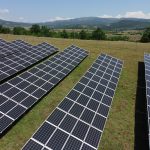Five EU countries are looking to introduce new fossil fuel subsidies by 2030, analysis of the 28 Member States’ draft energy and climate plans has revealed.
Despite long-standing commitments to ending fossil fuel subsidies, none of the EU Member States comprehensively report on their fossil fuel subsidies nor provide plans to phase them out.
In a new report, experts from the Overseas Development Institute (ODI), Friends of the Earth (FoE) Netherlands and Climate Action Network (CAN) Europe have analysed EU Member States’ draft National Energy and Climate Plans (NECPs), which require governments to report on their fossil fuel subsidies and plans to phase them out (1).
The authors of the report, “Fossil fuel subsidies in draft EU National Energy and Climate Plans: Shortcomings and final call for action”, found that several of the NECPs made no mention of fossil fuel subsidies at all, despite previous research showing all EU governments are continuing to provide support to oil, gas or coal (2).
The report finds that six Member States – Bulgaria, Denmark, France, Hungary, the Netherlands and the United Kingdom – claim no fossil fuel subsidies exist in the country. This is despite the European Commission previously finding all EU countries continue to provide some support to fossil fuels, with the UK providing €12 billion each year through tax breaks and budgetary transfers alone, more than any other EU state.
At the same time, while the NECPs reveal that the majority of Member States do not plan to phase out existing fossil fuel subsidies, the UK, Germany, Greece, Poland, and Slovenia even plan to introduce new fossil fuel subsidies, at a time of heightened awareness of the climate crisis and despite committing ten years ago to end such support. For instance, Greece mentions that it will introduce a subsidy aimed at replacing diesel boilers with fossil gas-fired ones, and Poland intends to provide subsidies for underground gas storage and the use of liquified natural gas for transport.
The report calls on each Member State to list all existing subsidy measures to fossil fuels using a common definition, and provide comprehensive phase-out plans in their final NECPs due by the end of this year, as requested by the European legislation governing the 2030 climate and energy framework.
Lead author Laurie van der Burg, climate and energy researcher at FoE Netherlands, said: “As part of the G20, EU governments committed to ending fossil fuel subsidies back in 2009. Ten years later, as the world is in the midst of a climate crisis, EU governments continue to provide huge sums of taxpayers’ money to fossil fuels, the single biggest cause of climate change.
“If EU governments are serious about climate action, they must turn their longstanding commitments to ending fossil fuel subsidies into concrete action plans. This will not only help address climate change but will also free-up scarce resources that can be better spent to build a sustainable future.”
Report co-author Ipek Gencsu, research fellow at ODI, said: “The climate crisis is more apparent than ever, with Europe suffering from unprecedented heat waves in recent months which has led to loss of lives. European governments have been stating their desire to act but continuing to pour billions of euros into fossil fuels does the exact opposite, locking countries into dirty, outdated energy systems and exacerbating the risks of climate change.”
Report co-author Markus Trilling, finance and subsidies policy coordinator at CAN Europe said: “Multiple times EU countries have declared their intention to phase out fossil fuel subsidies. The National Energy and Climate Plans are the opportunity to plan their phase-out and redirect investments towards renewable energy and energy savings.
“Member States have until the end of the year to get their homework done. Given the growing gap between the Paris Agreement objectives and what governments are doing, we face a climate emergency. Hence governments must focus their next decade’s investments on the clean energy transition. Putting an end to fossil fuel subsidies will free up necessary resources to allow Europe to reach net-zero emissions as soon as possible.”
ENDS
Contacts:
Nicolas Derobert, CAN Europe Communications Coordinator, nicolas@caneurope.org, +32 483 62 18 88
James Rush, Overseas Development Institute, j.rush@odi.org.uk,
+44 (0)7808 791265.
Notes to editors:
(1) The NECPs are required by the EU’s Governance Regulation that aims to ensure the EU is meeting the bloc’s 2030 climate and energy targets.
(2) Research commissioned by the European Commission shows that all EU Member States subsidise the use and/or production of fossil fuels to some extent. The institution has estimated fossil fuel subsidies provided by EU governments at €55 billion per year (EC, Trinomics, 2019). Study on energy prices, costs and subsidies and their impact on industry and households.
Climate Action Network (CAN) Europe is Europe’s leading NGO coalition fighting dangerous climate change. With over 160 member organisations from 35 European countries, representing over 1.700 NGOs and more than 47 million citizens, CAN Europe promotes sustainable climate, energy and development policies throughout Europe.



